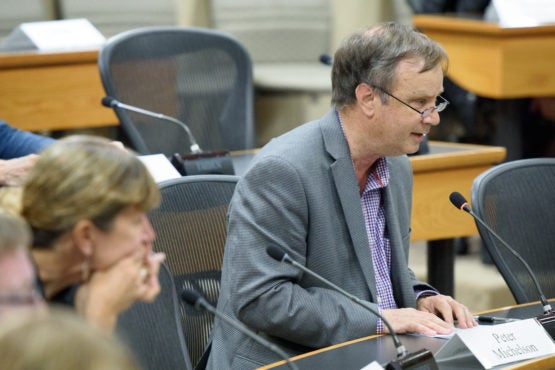Stanford’s Faculty Senate reaffirms its commitment to an open and inclusive community
The speakers at the Nov. 10 Faculty Senate meeting included Persis Drell, dean of the School of Engineering; Provost John Etchemendy; and Sean Bogle, associate director of the Office of Community Standards, who encouraged faculty to volunteer for the office’s judicial process.
The Faculty Senate on Thursday passed a resolution endorsing the university’s policies of inclusion in light of the recent presidential election.
Physics Professor Peter Michelson proposed the resolution supporting the sentiment expressed in a letter from university leadership to the Stanford family on Wednesday. The resolution read:
“Be it resolved that, in the immediate aftermath of the 2016 presidential election, the Senate of the Academic Council of Stanford University reaffirms its commitment to an open and inclusive community that embraces all members, irrespective of race, ethnicity, religion, gender, gender identity, sexual orientation, citizenship, abilities and political views, and that celebrates and learns from diversity. Our nation and the world face extraordinary challenges. We should all be engaged in understanding and addressing these challenges and making a difference in meeting them. As faculty, our most important responsibility is to provide a broad and purposeful education that serves this end.”

Professor Peter Michelson introduces a resolution at the Faculty Senate on Thursday. (Image credit: L.A. Cicero)
Provost John Etchemendy encouraged faculty to support students upset by the election results by reassuring them that the world is not “coming to an end” as a result of the election. The country is very resilient, he said.
“We need to do everything we can, as a faculty, to make sure that this administration is successful and the country is successful going forward,” he said. “That is a better way to support our students who are feeling so vulnerable. Tell them, on the one hand, that we as an institution are going to support them and do everything we can to make sure they’re supported. On the other hand, this is a very strong country and very resilient, and not to think the world is coming to an end. I urge you all to support them in that way.”
Persis Drell addresses the senate
Persis Drell, the dean of the School of Engineering who will become provost of Stanford in February, told the senate she was very excited about her new role and about working with President Marc Tessier-Lavigne.
She thanked Etchemendy for his dedication to the university.
“You’ve been the soul of this university for a very long time,” she said, turning to face the provost. “We’ve all appreciated your wisdom and your mentorship of us. I will need your help going forward and I know I can count on it.”
Drell said she believes passionately in the broad education that Stanford offers.
“I will be eager to hear your thoughts on how we best accomplish that in our technology-driven society,” she said. “Keeping strength broadly across all disciplines is essential to the success of this university and I’m very committed to it.”
Drell said she has lived in three “ecosystems” at Stanford, including the SLAC National Accelerator Laboratory, the Physics Department in the School of Humanities and Sciences, and the School of Engineering.
“Whereas from the outside, they may look kind of similar, their cultures have been very, very different, and it has taught me to appreciate the diversity of this university in its organization, its outlook and its culture – and I cherish it,” Drell said. “I have a lot to learn about many parts of this university. Over the next weeks and months, I will need you all to help me and be my teachers and I look forward to meeting with you.”
She said the search for a new dean of the School of Engineering is starting, and given the very deep bench of leadership in the school, the search will be internal.
Judicial panels
In other business, Sean Bogle, associate director of the Office of Community Standards (OCS) encouraged faculty members to participate in judicial panels that consider alleged violations of the Honor Code and Fundamental Standard, including plagiarism, unpermitted aid on work for academic credit, theft or misuse of funds.
The judicial process begins when a faculty or community member files a concern with the OCS. If a concern is not resolved – withdrawn by the reporting party or referred to a judicial officer for a different resolution – and the judicial officer determines there is sufficient evidence for charges to be filed, the OCS schedules a hearing. The judicial panels determine whether a violation occurred and, if so, determine sanctions.
Each panel has six members: four students appointed by the Associated Students of Stanford University; one faculty member appointed by the Faculty Senate; and a staff member appointed by the Vice Provost for Student Affairs. All service is voluntary. Last year, the OCS conducted 12 judicial panel hearings.
Currently, the senate has appointed about 27 faculty members to serve on judicial panels, though Bogle said actual participation was much lower. He said it was critical that the OCS be able to assemble panels in order to adjudicate cases.
“What we’re asking is for you to reach out to colleagues to see if they’re available and willing to serve in this process,” he said.
Bogle said the OCS is supporting the Stanford community by making sure that students are held accountable and are given a fair process.
“By having more faculty engaged we can ensure that we have an efficient process that works as smoothly as possible. We don’t want to expedite cases; we want to handle cases more efficiently. We want to close the gap between the time the concern is reported to the OCS and when the concern is resolved by a panel.”
The minutes of the Nov. 10 senate meeting, including the discussion that followed the announcement from the OCS, will be available soon on the senate’s website.
